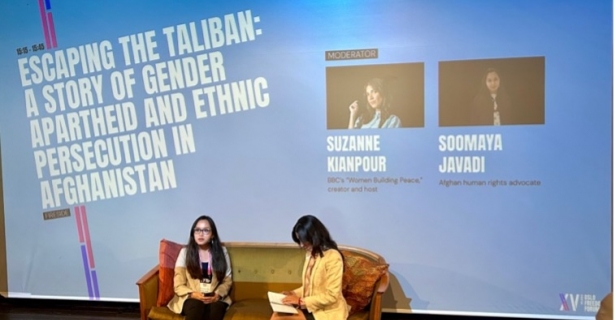Among the many new concepts that I learned during my three days at the Oslo Freedom Forum, I was particularly interested in the term “gender apartheid.” I first heard it used during an afternoon panel on the first day titled “Iran: The Final Revolution?” Human rights attorney Gissou Nia defined gender apartheid by reminding the audience that an apartheid is “the domination of one group over another in order to cement power relations,” and then adding that in the context of gender, an apartheid is “sex segregation to maintain a regime.” Unfortunately, gender apartheid is currently not criminalized under international law, even though racial apartheid is. However, Nia shared that the Convention on Prevention and Punishment of Crimes against Humanity is currently occurring, and with enough advocacy and education, gender apartheid could get included in the convention, and then be used to hold Iran accountable for their heavy repression of Iranian women.
Another mention of gender apartheid came on day three of the conference, during a conversation between Afghan activist and Hazara woman, Soomaya Javadi, and BBC commentator Suzanne Kianpour. Javadi built the case of an ongoing gender apartheid by providing many examples of the Taliban’s violence and mistreatment toward women, such as the 2020 attack at a maternity hospital in the majority Hazara area of West Kabul, where 16 mothers were killed. Javadi also brought light to a 2022 suicide bombing in a West Kabul classroom that killed 35 Hazara women and girls, as well as her personal experiences being forced to wear a veil. When asked why the Taliban goes after women specifically, Javadi explained that women pose a threat to the Taliban should they gain education and a platform in society to where their voices are heard. In this way, the actions of the Taliban line right up with Nia’s definition of gender apartheid, as the Taliban subjugates women in order to ensure the success of the regime.
After learning about the term gender apartheid, I could not help but consider what other stories from OFF 2023 could possibly fall under the definition as well. In addition to being a racial apartheid and genocide, the Chinese government’s treatment of its Uyghur peoples has put the Uyghur women at the disposal of the CCP. In her remarks on the main stage, Uyghur woman and camp survivor Gulbahar Haitiwaji painfully shared that many Uyghur women are forced to sexually entertain male “Han relatives” who come to Uyghur women’s houses when the men of the family are detained in the camps. This sexual exchange is an example of the Chinese government dominating Uyghurs, and specifically Uyghur women, by forcing them into relations.
Another potential example of gender apartheid may be found in some of the African state where women are not granted property rights. Speaking on a panel about the issue, Atlas group member and Sudanese woman Magatte Wade shared that “if you are about human rights, you must be about property rights,” since disallowing women financial freedoms such as the opportunity to build independent wealth has been demonstrated to keep them in abusive relationships, and push women into deep poverty if they become widowed. Also on the panel, Aimable Manirakiza shared that before his group’s efforts, it was written into Burundi law that women did not have property rights, effectively rendering them second class citizens. In the aftermath of OFF, I plan to look more into the potential for gender apartheid being added into the Convention on Prevention and Punishment of Crimes against Humanity. While simply labelling a situation a “gender apartheid” does not automatically push regimes towards equality, it may be a crucial first step toward accountability and justice among the international community.

